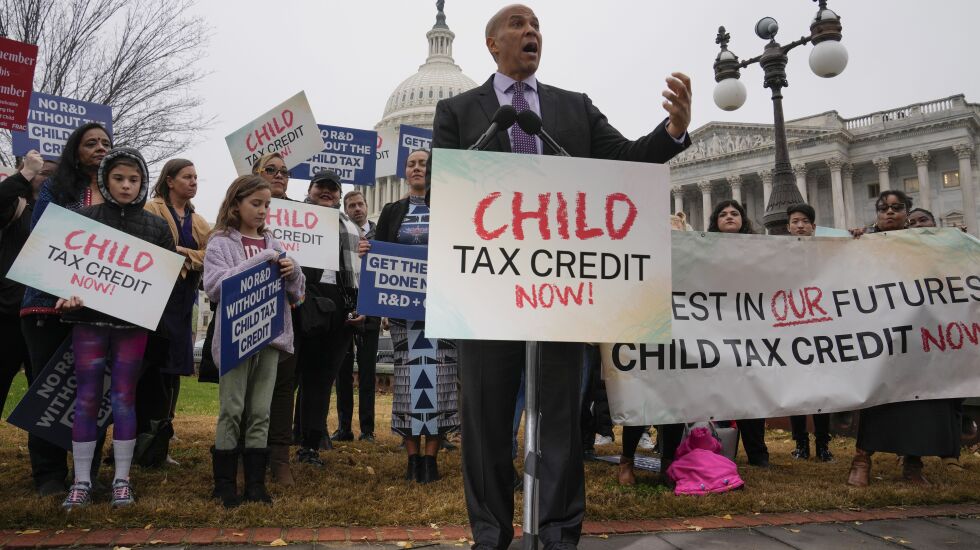
Too many members of Congress this month said “bah humbug” to helping millions of children living in poverty when Congress failed to extend the federal child tax credit.
Democratic lawmakers and progressive advocates pushed hard to include the extension in the massive $1.7 trillion end-of the-year spending bill approved by the U.S. House of Representatives last week, but the child tax credit didn’t make the cut.
Congress had expanded the child tax credit in 2021 as part of the American Rescue Plan Act, increasing the maximum credit from $2,000 to $3,600 per child under age 6 and to $3,000 per child aged 6-17,, and adding 17-year-olds for the first time. Other changes that helped some of our most impoverished neighbors included extending the credit to parents with little or no earnings and allowing half of the annual amount to be paid out in monthly checks.
More than 90% of the country’s most financially strapped families used their monthly checks to buy food, pay utility bills, make rent or mortgage payments, buy clothing and cover education costs, according to the Center on Budget and Policy Priorities.
The Washington, D.C.-based think tank noted the enhanced tax credit raised about 2.1 million children out of poverty — including an estimated 752,000 Latino children, 649,000 white children, 524,000 Black children, 89,000 American Indian and Alaska Native children, and 56,000 Asian children ― and lessened differences in poverty rates between children of all races and ethnicities.
This change in the federal tax code that lawmakers were willing to make just a year ago drove child poverty sharply downward, when it reached a record low of 5.2%, according to the U.S. Census Bureau.
But in January 2022, the credit reverted to the $2,000-per-child maximum credit amount, and as before, it’s no longer available to families who earn less than $2,500 a year and only partially available to households making up to roughly $30,000.
Not surprisingly, child poverty rose quickly this year after the enhanced tax credit expired, according to research conducted by the Center on Poverty & Social Policy at Columbia University. Many families have seen a reversal of fortune directly attributable to losing the tax credit, including lower disposable income and increased food hardship and financial strain, the center warned in November.
Federal lawmakers need to act
As this Editorial Board has urged before, Congress must make it a priority to restore this vital lifeline. The biggest point of contention, according to The New York Times, is who should receive the tax credit. Many Democratic lawmakers want to help the country’s lowest earners, while some Republican legislators want to help families who earn a certain amount to encourage parents to work.
Other Republicans, however, support extending the child tax credit to more of the neediest households. Last year, U.S. Sen. Mitt Romney, R-Utah, offered an alternative child tax proposal that included parents earning no income, but after pushback he added a minimum income of $10,000. In July at a panel sponsored by the American Enterprise Institute, the onetime GOP presidential nominee described his proposal — backed by other Republicans — as “pro-marriage, pro-work, pro-family,” and he said it sends the message that “we care about families, we care about helping people who decide to have a family.”
It will be challenging for the Democratic-controlled U.S. Senate and the newly Republican-dominated U.S. House of Representatives to find consensus. But we have faith our elected officials can find a way to help the 3.7 million children — including an estimated 138,000 Illinois kids — who sank back into poverty after the monthly payments ended in December 2021. In just one month, child poverty immediately spiked 41%, according to Columbia University’s poverty center — an unacceptable jump that none of us should have tolerated then, or now.
State legislators must act, too
This year, the Illinois General Assembly failed to act on legislation introduced in both chambers to pass a state child tax credit. While what was proposed in Springfield wasn’t as generous as what families had been receiving at the federal level, a $600 state credit would help folks in need, especially at a time when inflation continues to squeeze the state’s poorest households.
Dozens of lawmakers had signed onto legislation that would create a child dependent tax credit and expand the earned income tax credit. The Legislature did take action on the earned income tax credit, permanently increasing it from 18% to 20% of the federal credit and expanding the number of households covered.
But the child tax credit didn’t make it through either the Democrat-controlled House or Senate. It should be a priority for legislators and Gov. J.B. Pritzker, who included a child tax credit in his platform when first running for governor and later when he tried unsuccessfully to get the income tax referendum on the ballot.
Illinois should join the other 12 states that have already enacted a state child tax credit; it would be a step in the right direction to fight poverty that has trapped too many Illinoisians.
The Sun-Times welcomes letters to the editor and op-eds. See our guidelines.







